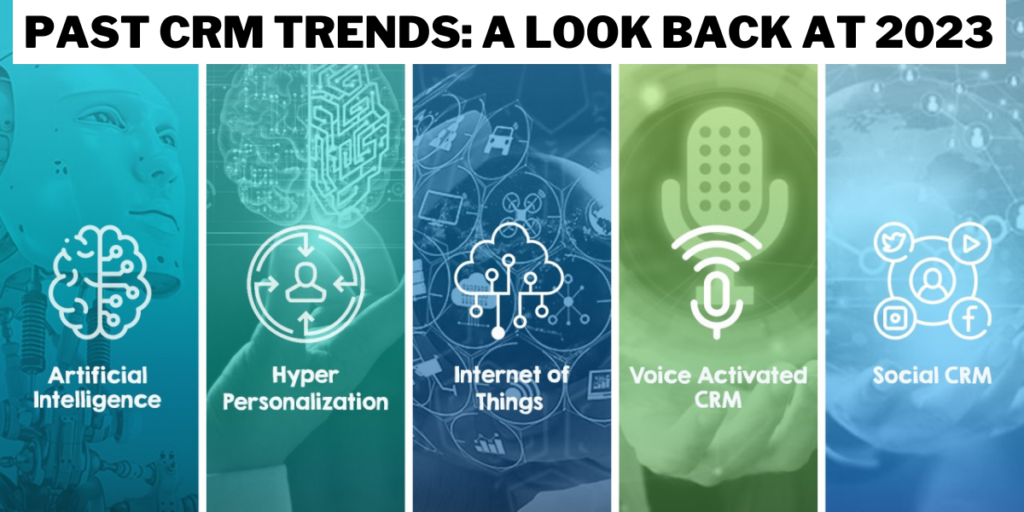
As we move into the year 2024, it’s important to take a look at the ever-evolving world of Customer Relationship Management (CRM). To understand how CRM systems, software, and the overall customer experience will be affected, it’s crucial to explore the top 8 CRM trends for 2024 that will shape the CRM landscape.
In this article, we will delve into the top 8 CRM trends to watch in 2024 and understand how they will impact CRM systems, software, and the overall customer experience.

Before diving into the anticipated CRM trends of 2024, let’s reflect on some key trends that dominated the CRM landscape in 2023. Understanding the past trends helps us appreciate the trajectory of CRM evolution and how these trends set the stage for the advancements we expect in 2024.
In retrospect, the CRM landscape of 2023 was defined by several pivotal trends that reshaped the industry. The focus on Personalization and Hyper-Segmentation took center stage, emphasizing tailored experiences and finely segmented customer interactions to cater to specific preferences. Alongside this, the Integration of Emerging Technologies such as AI, machine learning, and automation transformed CRM functionalities, offering enhanced insights and capabilities. Ensuring Customer Data Privacy and Compliance remained paramount, with stringent measures aligned with evolving regulations like GDPR and CCPA.
Additionally, the integration of Voice-Activated CRM introduced greater accessibility and engagement for users. Predictive Analytics for Customer Behavior emerged as a crucial tool, enabling businesses to anticipate customer behaviors and refine strategies accordingly. Moreover, deepening the Integration of Social Media into CRM platforms amplified customer understanding and engagement. Despite technological leaps, maintaining ‘The Human Touch’ in CRM interactions continued to be a crucial element. These trends from 2023 signify a transformative phase in CRM, laying the groundwork for the anticipated advancements expected in 2024.
Customer relationship management (CRM) software is one of the most important tools for businesses of all sizes. It helps you track and manage your interactions with customers, from leads to sales to support. In recent years, CRM has evolved rapidly, and there are now a number of new trends that are shaping the future of the industry.
In this blog post, we will explore eight of the latest CRM trends that you need to know about in 2024. These trends are:

AI in CRM isn’t just about automation; it’s about intelligent insights. AI-driven algorithms analyze customer behavior patterns, predict future trends, and recommend personalized actions. Machine learning algorithms enhance over time, offering more accurate predictions for sales, customer preferences, and potential churn risks.

Cloud-based CRM systems provide flexibility, scalability, and accessibility. They offer real-time data updates, allowing teams across locations to work collaboratively. Additionally, these systems often come with enhanced security measures, ensuring data protection and compliance with evolving regulations.

CRM systems now emphasize CX by consolidating customer data from various sources. This unified view enables businesses to offer personalized services, anticipate customer needs, and provide timely support. AI-powered chatbots and analytics enable quicker issue resolution and proactive engagement, enhancing overall satisfaction.

Data privacy regulations like GDPR and CCPA necessitate robust security measures within CRM systems. Encryption, permission-based access controls, and anonymization techniques are integrated into CRM platforms to ensure compliance while maintaining data usability for business insights.

CRM tools have evolved to encompass social listening and engagement features. They gather social media data to understand sentiment, track brand mentions, and engage with customers directly on various platforms. Insights gained from social media interactions aid in refining marketing strategies and enhance customer service.

Mobile CRM has shifted from being an extension to a primary mode of operation. Apps and responsive interfaces provide functionalities on par with desktop versions, facilitating sales teams’ activities, enabling field service operations, and empowering customer interactions from anywhere, anytime.

Chatbots have become sophisticated, leveraging Natural Language Processing (NLP) and AI to provide human-like interactions. They handle routine queries, offer product recommendations, and even assist in complex issue resolutions. As they learn from interactions, chatbots continuously improve their responses, enhancing user experiences.

CRM’s focus on personalization extends beyond just marketing. With detailed customer profiles and behavioral data, businesses can create hyper-personalized experiences. From targeted marketing campaigns to tailored product recommendations, personalization cements customer loyalty and increases engagement.
By embracing and adapting to these trends, businesses can effectively leverage CRM to not just manage relationships but also drive growth, innovate their strategies, and foster long-term customer loyalty in the ever-evolving market landscape of 2024.

As we step into 2024, the evolution of Customer Relationship Management (CRM) promises a transformative journey, building upon past trends to reshape the landscape further. Drawing from the pivotal trends of 2023 – hyper-personalization, AI integration, stringent data privacy, and the human touch in CRM – the future of CRM heralds a convergence of innovation and adaptability.
The imminent future of CRM revolves around the seamless fusion of AI, automation, and sophisticated analytics. AI-driven insights not only automate tasks but also forecast consumer behaviors, empowering businesses to preemptively meet customer needs. This evolution marks a shift towards hyper-efficiency, redefining CRM’s role in fostering lasting customer relationships and driving personalized user experiences.
The trajectory ahead foresees agile, mobile-centric CRM systems, empowering on-the-go operations for sales and service teams. Voice-activated CRM and integrated social media functionalities will redefine accessibility and customer engagement, allowing businesses to decipher sentiments in real time and recalibrate strategies accordingly.

Amidst technological strides, preserving the human touch in CRM interactions remains essential. The future beckons businesses to harmonize innovation with empathy, ensuring personalized, authentic user experiences.
In navigating these uncharted territories, businesses can harness CRM as a dynamic catalyst for growth, forging stronger relationships and carving their niche in an ever-evolving market landscape.
In conclusion, the future of CRM in 2024 and beyond is set to be shaped by the seamless integration of AI, automation, and customer data analytics. These trends will revolutionize CRM solutions and software, driving unparalleled levels of personalization, efficiency, and customer satisfaction. Businesses that embrace these emerging trends will be poised to excel in the dynamic world of customer relationship management.

The Real Benefits of Contact Management with CRM for Collecting Customer Data Managing and leveraging customer information has become a foundational aspect of success…
Can a CRM Really Automate My Sales Follow-Ups and Boost My Small Business Revenue? Small businesses face increasing pressure to maintain consistent communication with…
Best CRM Software for Sales Prospecting: Transform Your Sales Prospecting Struggling to turn cold leads into paying customers? You’re not alone. In today’s competitive…